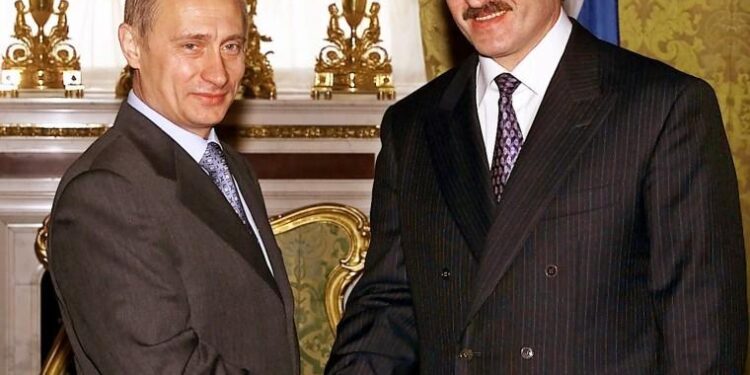Alexander Lukashenko, Belarus’s long-standing president, has indicated that his current term may be his last, signaling a potential shift in the country’s political landscape. In a statement reported by Reuters, the veteran leader, who has held power since 1994, acknowledged the possibility of stepping down after this tenure. This development comes amid ongoing domestic unrest and increasing international pressure, raising questions about the future direction of Belarusian governance.
Veteran Belarus Leader Lukashenko Indicates Potential End to Political Tenure
After decades at the helm, Alexander Lukashenko, Belarus’s long-serving president, has publicly hinted that his current term could be the last. This announcement marks a significant moment in Belarusian politics, where Lukashenko has maintained a tight grip on power since 1994. While the leader has not outlined concrete plans for succession, his remarks suggest an openness to political transition amid increased international pressure and internal demands for reform.
Experts note several potential implications of Lukashenko’s statement:
- Political Stability: Uncertainty around succession could trigger shifts within the ruling establishment.
- International Relations: Western sanctions and diplomatic isolation might influence Minsk’s future policies.
- Domestic Reform: Emerging opposition forces may gain momentum as discussions about Belarus’s political future intensify.
| Aspect | Current Status | Potential Impact |
|---|---|---|
| Leadership Tenure | Nearly 30 years | Possible end within one term |
| Opposition Strength | Growing | Increased political competition |
| International Sanctions | Severe | Diplomatic isolation, economic strain |
Implications for Belarusian Domestic Policy and Regional Stability
Should Alexander Lukashenko indeed step down at the end of this term, it would mark a significant shift in the Belarusian political landscape after nearly three decades of his rule. Domestically, this development could catalyze reforms in governance and civil liberties, as new leadership may seek to address lingering economic challenges and public discontent. However, the power vacuum could also provoke internal instability, as various political factions vie to define the country’s future direction. Key areas likely affected include:
- Potential relaxation of media restrictions and increased political pluralism
- Reassessment of state control over the economy and foreign investment policies
- Expanded dialogue with opposition groups and civil society
- Risk of heightened internal power struggles in post-Lukashenko transition
Regionally, Lukashenko’s possible exit introduces uncertainty regarding Belarus’s geopolitical alignments, especially its strategic relationship with Russia. While Minsk has long balanced Moscow’s influence with ties to the West, a leadership change could either deepen Belarus’s integration within the Eurasian bloc or open pathways for greater Western engagement. Neighboring countries are closely monitoring these dynamics, aware that any instability could ripple across Eastern Europe affecting security cooperation and energy routes. The following table outlines potential regional scenarios stemming from this transition:
| Scenario | Impact on Regional Stability | Possible Belarusian Policy Shift |
|---|---|---|
| Continued Russia Alignment | Maintained status quo; predictable security framework | Reinforced military and economic ties with Moscow |
| Opening to the West | Potential tensions with Russia; increased EU engagement | Greater investment, reforms, and human rights focus |
| Scenario | Impact on Regional Stability | Possible Belarusian Policy Shift |
| Continued Russia Alignment | Maintained status quo; predictable security framework | Reinforced military and economic ties with Moscow |
| Opening to the West | Potential tensions with Russia; increased EU engagement | Greater investment, reforms, and human rights focus |
| Internal Fragmentation and Instability | Increased regional uncertainty; risk of spillover conflicts | Uncoordinated policies; weakened state institutions |
| Balanced Multi-vector Foreign Policy | Moderate regional stability; diplomatic balancing act | Maintains ties with both Russia and the West, pragmatic approach |
Summary:
Lukashenko’s departure can potentially usher in a period of transformative change for Belarus, affecting both domestic policy and the country’s international positioning. While opportunities for democratic reforms and economic modernization exist, risks of internal instability and shifting alliances could
Recommendations for International Engagement Amid Leadership Transition
As Belarus stands on the cusp of a potential leadership change, global partners must adopt a nuanced approach to engagement. Building open channels of communication with emerging political figures and civil society leaders can foster stability and ensure continuity in diplomatic relations. It is essential for international actors to balance caution with constructive dialogue, recognizing the delicate nature of transition periods in countries with entrenched leadership.
Targeted support for democratic institutions and human rights organizations should remain a priority, while also respecting Belarusian sovereignty. Key recommendations include:
- Enhancing economic partnerships that incentivize reforms without abrupt disruptions.
- Facilitating multilateral forums that include Belarusian stakeholders from diverse backgrounds.
- Monitoring developments closely to respond rapidly to political shifts.
| Engagement Area | Recommended Action | Expected Outcome | |||||||||
|---|---|---|---|---|---|---|---|---|---|---|---|
| Diplomatic Outreach | Regular dialogues with transitional leaders | Maintain stability and influence | |||||||||
| Economic Policy | Conditional trade agreements | Encourage gradual reforms | |||||||||
| Civil Society Support | Funding and training It looks like the last table row was cut off. Here’s the completed version of your table and the section: “`html As Belarus stands on the cusp of a potential leadership change, global partners must adopt a nuanced approach to engagement. Building open channels of communication with emerging political figures and civil society leaders can foster stability and ensure continuity in diplomatic relations. It is essential for international actors to balance caution with constructive dialogue, recognizing the delicate nature of transition periods in countries with entrenched leadership. Targeted support for democratic institutions and human rights organizations should remain a priority, while also respecting Belarusian sovereignty. Key recommendations include:
|
















